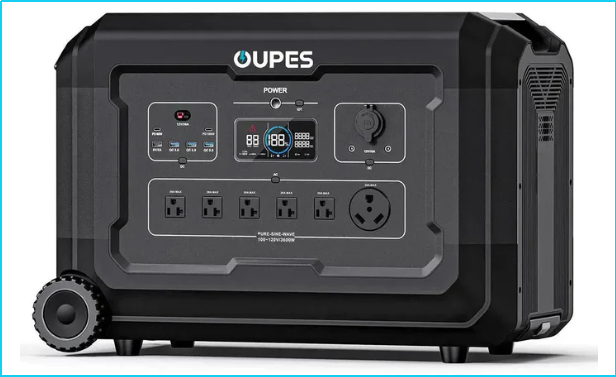
Table of Contents
- TL;DR / Key Takeaways
- What “Off-Grid” Really Means
- Legal Overview: Federal, State, and Local Layers
- Key Requirements for Going Off-Grid
- Regional Variation: States, Zoning & Building Codes
- Energy Systems: Solar Generators & Portable Power Stations
- Comparison Table: Grid-Tied vs Off-Grid Residential Setup
- FAQ
TL;DR / Key Takeaways
Yes — you can legally live off the grid in the United States, but success depends on compliance with local zoning, building codes, water and waste regulations, and power system requirements. Selecting the right location, installing a proper renewable energy system with storage (for example a portable power station), and meeting regulatory obligations are essential for a lawful and resilient off-grid lifestyle.
What “Off-Grid” Really Means
“Off-grid” typically refers to homes or dwellings that are not connected to one or more utility services—such as electricity, water supply, or sewer systems. Some households choose complete independence; others simply generate their own power and still maintain other utilities.
In terms of electricity, an off-grid setup might include solar panels plus batteries or a standalone generator instead of relying on the local grid. To succeed, you also need to ensure water supply (well, rain-catchment), waste disposal (septic, composting), and legally acceptable dwelling status.
Legal Overview: Federal, State, and Local Layers
Federal Level
There is no federal law that prohibits living off-grid. Producing your own electricity or water is not inherently illegal in the U.S. However, you must still comply with federal tax laws, FAA rules (if relevant), and national appliance/safety standards.
State & Local Level
The real legal complexity lies in state and local regulations. According to one analysis: > “Off-grid living itself is legal in the U.S., but the way you go about it is tightly regulated. Many legal issues stem from zoning laws, building codes, and utility disconnection rules.”
For example, some states mandate grid-tie solar systems if a utility connection is available; others enforce minimum dwelling sizes or require septic systems and approved well permits.
Key Requirements for Going Off-Grid
Zoning and Dwelling Approval
Your land must be zoned for residential use (or agriculture/homestead). Many counties prohibit long-term occupancy of dwellings not meeting minimum size or foundation standards. “Tiny homes” or RVs may be considered camping unless properly permitted.
Permits for Water and Waste Systems
Even off-grid homes must often meet state health codes for water and waste. If you dig a well, install a septic system, or collect rainwater, you may need permits and inspections. Some areas prohibit rainwater harvesting without approval.
Energy System Compliance
Your power system (solar panels, batteries, generator) must meet electrical codes (NEC), inverter certifications, and safety standards. If you disconnect from the grid in an area where utility service is required, you may be in violation.
Taxes & Minimum Service Charges
Living off-grid doesn’t exempt you from property tax, income tax, or local assessments. Even if utilities are not in use, landowners still owe tax and often minimum municipal fees.
Regional Variation: States, Zoning & Building Codes
Some states are more favorable than others for off-grid living. For example, rural counties in Missouri, New Mexico, and South Carolina may have fewer building codes, fewer minimum dwelling standards, and more tolerance for alternative water/waste systems.
Conversely, states such as Florida or California may allow off-grid living but still enforce strict building codes, require grid-tie solar in some jurisdictions, or forbid long-term occupancy of RVs or mobile homes without certification.
Energy Systems: Solar Generators & Portable Power Stations
When living off the grid, the energy system must reliably meet your loads and energy demands. A typical off-grid setup may include:
- Rooftop or ground-mounted solar photovoltaic (PV) panels.
- Battery storage system to cover night and cloudy days.
- Backup generator for extended low-sun periods.
Portable power stations can play a useful role—they allow modular, scalable backup power and can be paired with solar to provide flexible storage. Brands like OUPES design these units with off-grid compatibility in mind (LiFePO₄ batteries, multiple outputs, portability).
For example, if your off-grid location gets strong sun but occasionally cloudy, a portable power station lets you store surplus solar and manage loads more dynamically rather than oversizing your main battery bank.
Comparison Table: Grid-Tied vs Off-Grid Residential Setup
| Feature | Grid-Tied Home | Off-Grid Home |
|---|---|---|
| Electricity source | Utility grid + optional solar | Solar + batteries ± generator; no grid connection |
| Permitting complexity | Standard residential permits | Permits for dwelling, water/waste, alternative systems; may be more complex |
| Utility bills | Monthly grid bills | No grid bills but cost of system + maintenance |
| Storage/reserve | Minimal (grid acts as backup) | Critical to have battery reserve + contingency system |
| Regulation burden | Standard residential codes | Varies widely by state/county—zoning, water rights, waste disposal |
FAQ
1. Is it illegal to live off the grid in the U.S.?
No—off-grid living in itself is not illegal. What matters is compliance with local zoning, building, water, and waste regulations.
2. What’s the hardest part of living off-grid legally?
The toughest hurdles are often local: zoning that limits dwelling types, building codes requiring minimum square footage, well/septic permits, and utility disconnection rules in some areas.
3. Do I need to live in a remote location to go off-grid?
Not necessarily, but rural locations often have fewer restrictions. Off-grid living in suburban or urban contexts faces more obstacles (HOAs, minimum lot size, building code enforcement).
4. How does a portable power station help with off-grid readiness?
It gives you a modular, flexible backup power solution that complements solar and battery installations—especially helpful in remote or interim setups while meeting local code for renewable power.
5. Can I truly disconnect from the grid and utility bills?
Yes, but you’ll still likely have costs: property tax, maintenance, permit fees, system equipment, and potential inspections. “Off-grid” doesn’t mean “cost-free.”




























